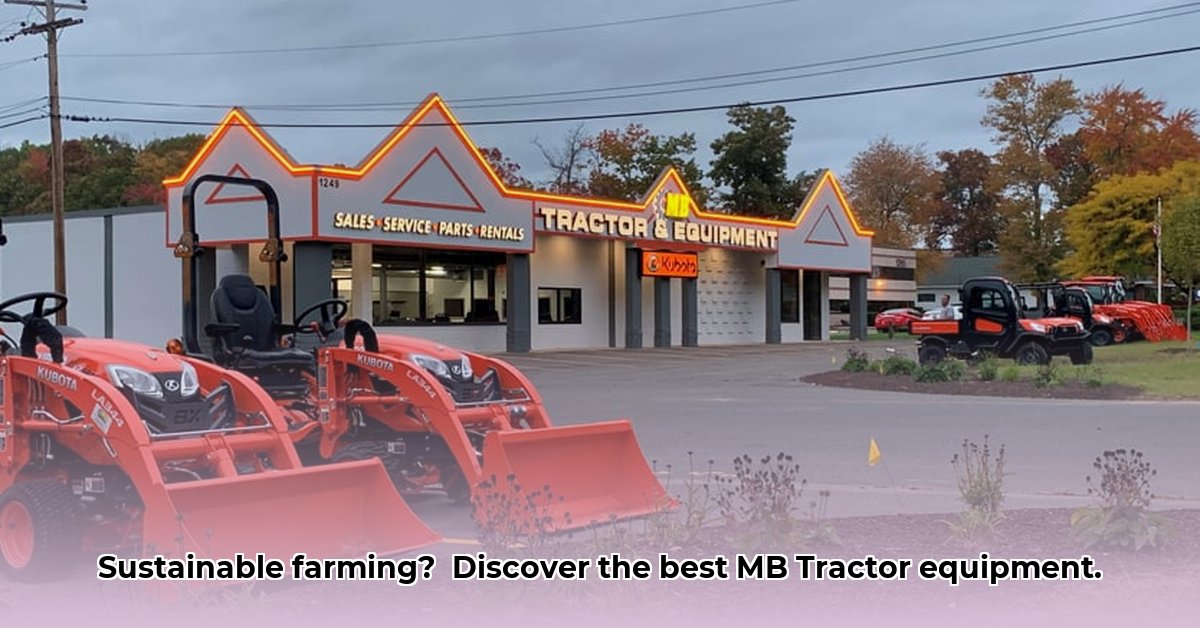
mb Tractor Equipment Eliot Maine: Sustainable Farming Practices in Maine
Maine's agricultural landscape presents unique challenges: short growing seasons, harsh winters, and a growing demand for environmentally responsible farming practices. Farmers need reliable, efficient equipment that minimizes environmental impact – equipment like Kubota tractors. This article explores Kubota's role in helping Maine farmers, particularly those in Eliot, achieve sustainable agriculture goals. We'll examine Kubota's contributions to fuel efficiency, durability, and the supportive role of their dealer network. We'll also address the ongoing challenges and the future of sustainable farming technology with a focus on Kubota's place within it. For smaller farms, consider exploring other options like subcompact tractors.
Kubota Tractors: A Maine Staple
Kubota's reputation for building durable, long-lasting machinery is a significant advantage in Maine's demanding climate. A durable tractor equates to less frequent replacements, reducing both the financial burden and the environmental impact associated with manufacturing, transportation, and disposal. This longevity significantly decreases the overall environmental footprint. Isn't that a worthwhile investment for farmers looking to balance environmental responsibility with profitability? This inherent advantage of long-lasting machinery directly contributes to sustainability.
The Environmental Picture: Beyond Initial Impressions
While a durable tractor inherently supports sustainability, a comprehensive understanding demands a more rigorous analysis. A Life Cycle Assessment (LCA) – a holistic evaluation of a product's environmental impact from cradle to grave – is the gold standard. This assessment considers all phases: raw material sourcing, manufacturing, transportation, usage, and end-of-life management. Comparing Kubota's LCA data (where available) with competitors would provide a valuable benchmark within the agricultural machinery sector. The absence of readily available, comprehensive LCA data currently limits a definitive assessment of Kubota's overall environmental performance. Further research in this area is crucial.
The Vital Role of Local Dealerships
The extensive Kubota dealer network in Maine is a critical factor contributing to sustainable farming practices. Ready access to parts and skilled technicians ensures minimal tractor downtime. Reduced downtime directly translates to increased farming efficiency and potentially lower fuel consumption. However, a complete assessment must also factor in the environmental impact of the dealer network itself, including fuel used for transportation of parts and service personnel. This requires a balanced analysis weighing the benefits of efficient repairs against the environmental cost of maintaining the dealer network.
The Future of Sustainable Farming with Kubota
Kubota's future hinges on furthering its commitment to sustainability. This necessitates significant investments in research and development (R&D), focusing on alternative fuels. The exploration of biofuels or even electric tractors could dramatically decrease reliance on fossil fuels. Increased transparency, such as publicly available sustainability reports, will build trust and hold Kubota accountable for its environmental pledges. Impending regulations concerning emissions and resource use will only accelerate innovation within the industry. We can anticipate stronger government incentives for the adoption of sustainable agricultural equipment in the near future.
Farmer Stories: Real-World Evidence
To fully grasp Kubota's impact, firsthand accounts from Maine farmers are essential. Case studies and testimonials showcasing how Kubota equipment facilitates sustainable farming practices would provide critical insights. These real-world examples, coupled with broader analyses, would build a more nuanced understanding of the equipment’s impact.
Practical Steps Towards Sustainable Farming
Farmers in Eliot, Maine, and throughout the state can take several proactive steps:
- Thorough Warranty Review: A robust warranty demonstrates confidence in the equipment's durability, a key element of long-term sustainability.
- Dealer Network Assessment: Evaluate the accessibility and responsiveness of local dealerships; their efficiency influences uptime and repair speed.
- Fuel Efficiency Comparison: Compare fuel consumption among different Kubota models; lower fuel use reduces operational costs and minimizes the carbon footprint.
- Government Incentive Research: Investigate available grants and tax incentives for adopting sustainable agricultural equipment. These programs can significantly reduce the financial burden of such investments.
Weighing the Advantages and Disadvantages
Kubota tractors, like any technology, offer benefits and drawbacks within the context of sustainable agriculture.
| Advantages | Disadvantages |
|---|---|
| Proven durability and extended lifespan | Current reliance on fossil fuels |
| Extensive and reliable dealer network | Limited publicly available detailed environmental impact data |
| Potential for significant fuel efficiency improvements | High initial investment may be a barrier for some farmers |
| Indirect contribution to sustainability objectives | Manufacturing and supply chain impacts require further study |
Ultimately, the journey towards sustainable farming is a continuous process. It requires collaboration between farmers, manufacturers like Kubota, and researchers to consistently improve practices and technologies. While Kubota offers considerable potential benefits, a more comprehensive understanding of its complete environmental impact is vital for making responsible decisions. The future of sustainable farming relies on continued learning, innovation, and transparency.